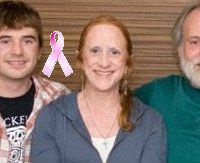1. KNOW YOUR DIAGNOSIS: If you can see the enemy, you can fight it. So insist on seeing your X-rays, lab results, CT scans, mammograms, bone scans & MRIs. Acknowledge the seriousness of your diagnosis. This involves knowing the name of the cancer under the microscope, the size and grade of the tumor, and whether this is viewed as slow growing or as an angry process.
Bring in a family member or a friend who can think clearly with you and act a your advocate in asking questions and writing down the doctors' responses. Why? Because most patients retain very little information when their circuits are overloaded by a serious diagnosis.
2. BE IN CHARGE: Create an equal partnership between you and your physicians (surgeon, oncologist, primary care doctor). don't give up or just go along with medical decisions made by s omeone else. Ask your family and friends for support, but do not proceed with treatment just because they think it is the "right" thing to do.
3. KNOWLEDGE IS POWERFUL MEDICINE: Knowing the language of medicine will help you talk effectively with the medical specialists holding your future and make smart decisions about your treatment. You can become an expert in your illness---just as you may have learned about the financial world to invest in the stock market, or the ins and outs of buying and selling on eBay. The availability of health info on the Internet can be your friend.
4. EXPLORE YOUR TREATMENT OPTIONS: Your doctor will lay out options, but the buck stops with you. It's your decision which path you pursue. Ask the pros and cons of medication, surgery, chemotherapy, radiation, diet, and further sophisticated testing and clinical trials. Make sure you know the goal of treatment. Decide what you are "buying" with each option or combination of options. You CAN do nothing: One often-overlooked option is to accept no treatment or no further treatment.
5. ASK FOR A SECOND OPINION: When you're no satisfied with your diagnosis, treatment, or progress, you'll want to get a second opinion. No single institution and no single physician or health care provider can have complete information about every condition. As professionals, they should not be offended if you want to seek a second opinion. This is a common practice in medicine today.
6. TAKE TIME TO TAKE YOUR BEST SHOT: Any serious diagnosis is devastating and paralyzing, so take time to think about your course of action before you rush to treatment.
With breast cancer, the signs and symptoms may have been present and undetectable for up to six years, not just since yesterday. Therefore, there usually is no real urgency to rush into treatment within a day or two of diagnosis. Keep in mind that many treatment options cannot be reversed. For example, removal of a breast is major life-altering event.
Have some understanding of the natural history of your disease. Ask your doctor to explain the typical track record and progression. As with most situations in life, your first shot is the best. Gather all the info and opinions, and then make informed decisions to take your best shot.
7. SET UP YOUR SUPPORT SYSTEM AND KEEP EVERYONE THINKING POSITIVELY: Social connectedness is one of the biggest factors in explaining why some patients do better with serious illness than others. Well-controlled studies have shown that the support of family, friends and even pets lifts spirits mentally and boost immune systems physically. Families need to be supportive of the patient's decisions-----NO MATTER WHAT THOSE DECISIONS ARE.
8. DO NOT SECOND-GUESS YOUR HEALTH CARE DECISIONS: Don't look back. Plan ahead. Trust your instincts on your treatment, and maintain a comfort level with your care-providing team. If you don't think someone is acting in your best interest, get someone who is.
9. LIFE IS A FULL-TIME JOB-SET PRIORITIES: Time wil take on new meaning. Make the most of it. Life when you're healthy is a full-time job. Be realistic when you're operating at less than 100 percent. Cut back. Slow down and smell the roses.
Nobody can go it alone, and now is the time to reach out and seek the help you need from friends and neighbors. Acknowledge the importance of a support system. A friend or confidante can be an anchor during some stormy times. Don't ignore the resources of your religious group, if you have one.
Subscribe to:
Post Comments (Atom)

I love this!! Lots of great information. I have so much info about my health stuff & so many medical records, that I have to keep them all in a big plastic tub thing & it weighs a tons. But it really is important. I always get copies of everything I have done, bloodwork, scans, doctors notes, everything. When it comes to cancer, you gotta know what's going on. At the beginning, if my husband hadn't been there with me, I wouldn't have known anything. He asked the questions, he wrote everything down, he did the research. Then when it comes to support, you gotta have it. There are lots of support groups out there. Some in person, some online, some on the phone, whatever way you are comfortable, you need to do it. Thanks Susie for being so diligent with informing people of this stuff, it's so important.
ReplyDelete